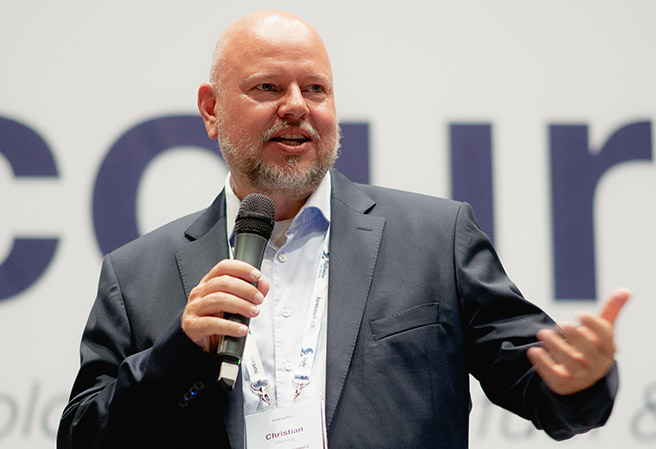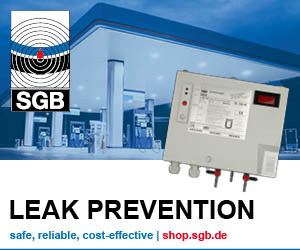In October, forecourttech 2024 will unite fuel and convenience retailers with solution providers for two days dedicated to exploring technology-driven disruptions. Christian Warning founder of The Retail Marketeers and partner of forecourttech ’24 spoke to Mobility Plaza about what you can expect from this year’s event.

Question. Overall, what can visitors expect from forecourttech‘ 24?
Answer. A major aspect is the quality of the programme. It features a strong lineup of global experts and subject matter specialists in retail technology related to convenience and mobility, which is a core part of forecourttech’s DNA. forecourttech is also a hub for thought leadership and learning, offering valuable insights from industry experts throughout the programme, and providing a meetings platform where suppliers and retailers can pre-schedule meetings with one another.
Q. What makes this event special compared to others?
A. I think it’s the total focus, a bullseye focus you can call it, on retail technology that’s all about market trends and evolving technology. You do not have anyone who is not related to retail technology as delegates are qualified as either looking for tech solutions or providing them. Retailers get two days focused on tech and a good overview of the latest trends and developments, in essence, the content is relevant to delegates and the delegates themselves are relevant contacts for each other.
Q. In a way, this represents a turning point in the industry, which used to be more focused on underground storage tanks and pipes. Now it’s AI, digital payments, and energy management systems.
A. There are so many aspects around tech. In roadside retail, it’s still about location, location and location. But I believe it’s now about tech, tech and tech as well.
So it starts with the data we have as convenience and mobility retailers. But a lot of people do not use them in a proper way where they are.
Gray Taylor says that data is like oil under your store – you have to frack it and use it. If you combine your own data with publicly available or purchased data, like geolocation or movement data, you’ll get a much better understanding. It’s no longer about relying on gut feelings, like in the past when high-traffic roads and easy accessibility were the main factors. Now, it’s about using data to perform hyper-local analyses and determine the true sales potential and the right services for the right customers, which may vary from one side of the road to the other.
That’s just the starting point. The entire tech ecosystem is evolving. AI, for instance, plays a big role in fuel pricing, shop assortment, and process optimization, shifting tasks from staff to customers. Then, with loyalty programmes and the digital ecosystem, you’re not just attracting customers but also driving up their spending through these tools. Coffee shops and car washes are great examples of disruption caused by loyalty programmes and the technology that makes them possible.
Q. Today we see an incredibly dynamic, complex ecosystem. Do platforms like forecourttech help the industry stay on top of these changes?
A. Exactly, and that’s also why retailers keep coming back every year. Dedicating at least two days a year to tech and the latest advancements, while also having the opportunity to talk with peers is invaluable.
It’s also a relaxed venue that can feel like a family and friends event. This makes the conversations much easier. You have talks at the dedicated conference matchmaking tables that enhance the exchange.
Q. You’ve been heavily involved in the conference programme. What are some of the highlights of this year’s conference?
A. We have a strong mix of highly relevant topics in the conference. We feature some of the biggest names in the industry. For example, we have Gray Taylor and Mark Wohltmann from Conexxus and NACS, sharing their views on the latest developments in tech and their global insights.
Dan Munford will be showcasing the best of the best EV hubs and convenience stores, and I’ll be his wingman from Germany, sharing best practice examples from our travels. I typically visit around 1,000 sites a year across 25 countries on three continents, so that knowledge builds exponentially.
The programme also includes insights from Boston Consulting Group on e-mobility. We have dedicated panel sessions on cybersecurity and generative AI, involving both industry leaders and suppliers.
And, of course, payment is always a big topic – it’s essential to focus on the most important part, which is collecting the money. We also have use cases from retailers, like Sergio Padilla Navarro from Valora and Femsa, who is speaking in Europe for the first time about their business. We actively ask retailers what they want to hear, and that’s how we shape the programme.
Q. Smart stores are an interesting topic to look at. Last year there were various presentations on this theme but we’ve seen the level of “hype” decrease.
A. Absolutely, and that’s what’s so exciting. Something that might have seemed like a buzzword five years ago, like EVs, can slow down in markets like Germany, and suddenly people in the industry think it’s over. But it’s similar to the internet or the iPhone – there were big predictions that they wouldn’t succeed, and we all know how those turned out.
In Germany, certain smart store models are thriving in rural areas where there’s little else available. On the other hand, others question whether it’s worth the cost. That’s why we’re seeing trends toward smaller, hybrid concepts, like smart fridges and vending solutions. At the conference, for the first time, we’ll feature a new development from a supplier and retailer collaboration. They’re making an effort to bring their physical solution to the event, and we’ll have a panel discussion around it, involving others working on robotics and similar innovations.
It’s about finding the right use case and business case. That’s the smartness of retail – big retailers are experimenting more with convenience, trying new things, learning from failures, and then applying those lessons.
Q. Are there any other elements you’d like to highlight from the event?
A. The new technology disruptors award presented in partnership with Germany’s Q1 Energie. They present the winner of the SmartCityHouse Summit, which supports innovative start-ups. The day before the event, Dan Munford will be heading a study tour in Madrid with Repsol, Galp, and Cepsa. Those who attend can make the most of their trip to Spain.



